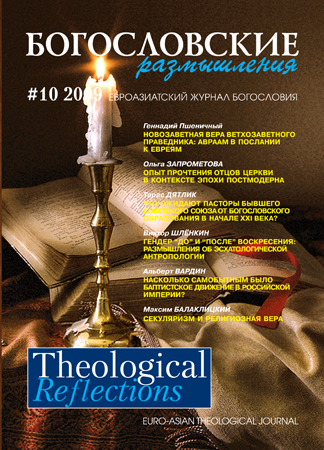Secularism and Religious Faith
Keywords:
Secularism, secular ideology, secular worldview,Abstract
In apologetic work below author compares the ideal types of secular ideology (being understood as superstition) and religious one (as faith in God), showing a competitive and conflictual nature of their interaction. The article demonstrates ideological and moral bankruptcy of secular worldview, his apophatic, negative pathos of pseudo freedom from one’s duties and relations, and, as a result, from the meaning and true value of human life.
The purpose of this document is to criticize the theology of political correctness, i.e. attempts to soften the adherence to Biblical principles of moral evaluation of the atheistic way of life, as well to criticize the false spirituality of New Age movement that would return a civilized consumer to the pagan deification of human instincts.
Separation of Church and State, bought with the lives of thousands of Protestants, is one of the major achievements of Modern time. Solving the problem of moral degradation of society lies not in the reduction of the space of freedom like it was in the medieval Catholic Europe, but in the following moral precepts of the Gospel by the Church, not the short-term political order, albeit with a religious tinge, and the continued execution of the Great Commission.
Downloads
How to Cite
Issue
Section
License
Copyright (c) 2020 Maxim BALAKLITSKY

This work is licensed under a Creative Commons Attribution-NonCommercial 4.0 International License.
All articles published in the Journal are distributed under a Creative Commons Attribution-NonCommercial 4.0 International License
By submitting an article for publication in Theological Reflections: Eastern European Journal of Theology the author grants the editors the right to publish the article and distribute it in electronic and print form.
The author reserves all copyrights and the right to use the materials of the article in whole or in part for educational purposes, to write his own dissertations, to prepare abstracts, conference reports, oral presentations, etc., as well as post electronic copies of articles (including the final electronic version downloaded from the journal’s official website) on non-commercial web-resources without the consent of the editorial board and founders.



